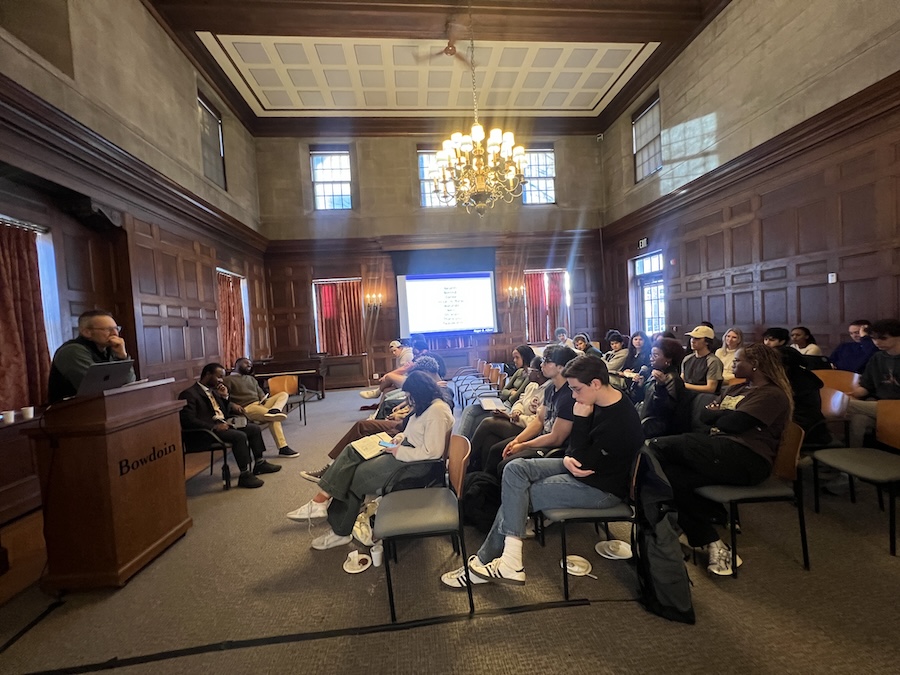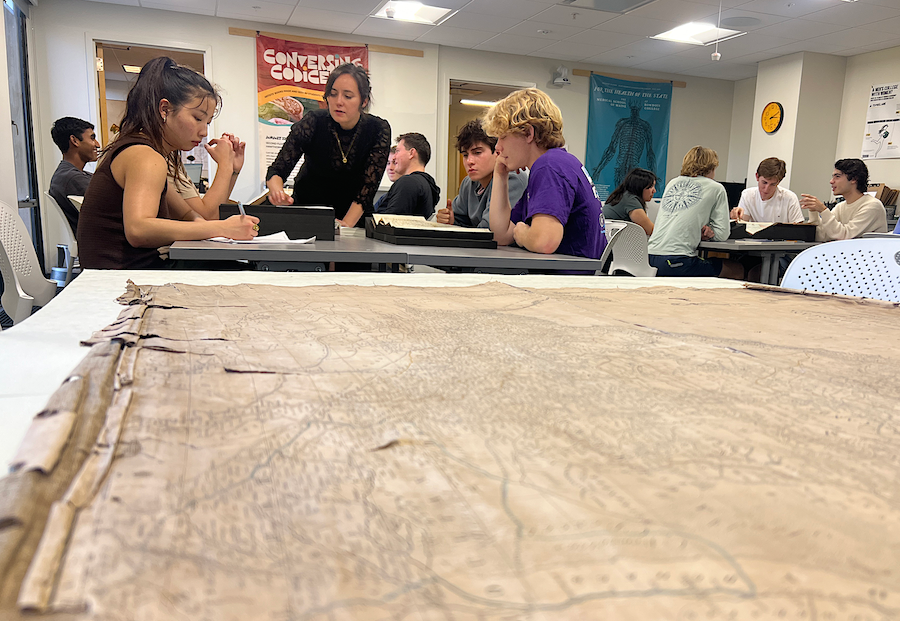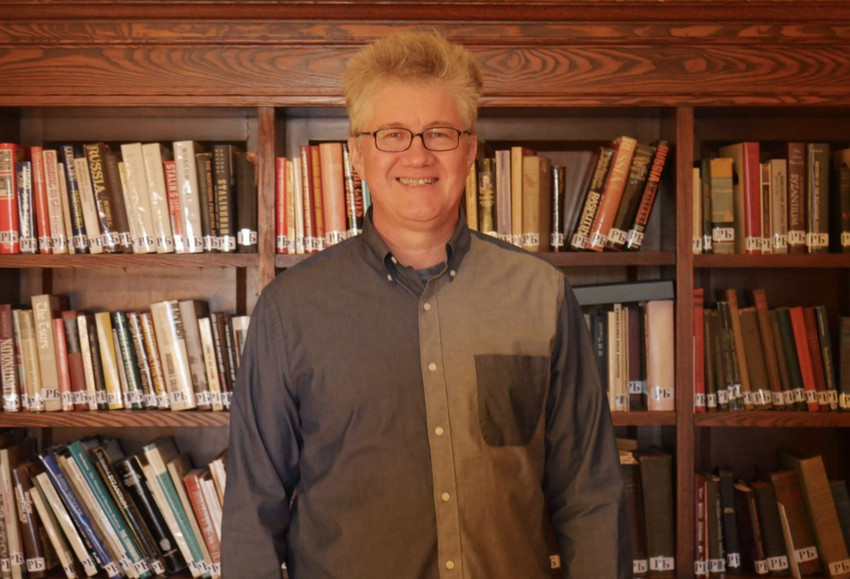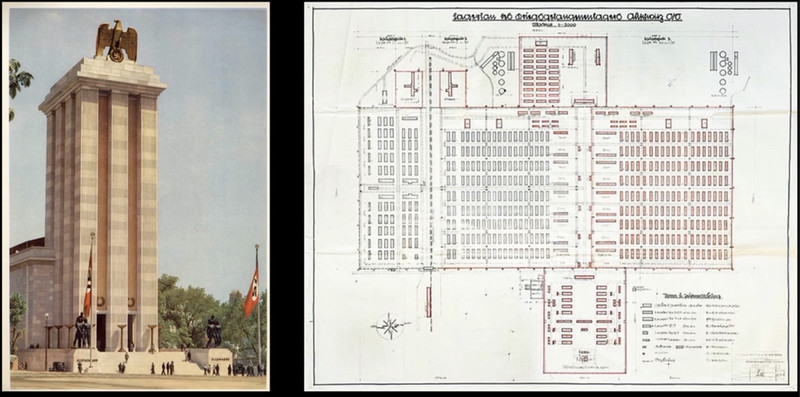"The 1619 Project" and Making Sense of the Recent Election
By Rebecca Goldfine
"The 1619 Project" is a series of essays, published in 2019 on the 400th anniversary of the beginning of slavery in America, that seeks to reframe the country’s historical narrative by placing slavery and the contributions of Black Americans at its core.
This fall, the history department organized a four-part discussion series based on "The 1619 Project" to share their thoughts with the Bowdoin community about what the project contributes to both our public discourse and to our understanding of the practice and discipline of history.
In their conversations, they articulated the project's merits and its shortcomings and grounded their reflections within the present moment of racial reckoning in the US. The impetus for offering the program, the faculty said, was to answer the call from Bowdoin students and colleagues "to address the outrage, protests, and pain following the murder of George Floyd as well as the continuing importance of the Black Lives Matter movement."
Matt Klingle moderated the concluding conversation, on Friday, Nov. 6, with panelists Brian Purnell, Dallas Denery, and Meghan Roberts. In their wide-ranging discussion, the faculty touched on many topics, including criticisms of "The 1619 Project," Black patriotism, voting disenfranchisement, and the unique nature of President Trump's celebrity. They also shared insights into why history matters so much to politics today, and why it exerts an ever-lasting emotional pull for citizens.
Readers with a Bowdoin login can watch the full video, as well as the three previous events. Below is a sampling of quotes from the Nov. 6 discussion, called "Plenary #4: "The 1619 Project" and Making Sense of the 2020 Election."
History, it's based on facts and evidence, but it's also political and emotional
Meghan Roberts noted that, on the eve of the election, President Trump issued an executive order to establish an advisory 1776 Commission, which appears to be a reaction, in part, against "The 1619 Project." The order states:...In recent years, a series of polemics grounded in poor scholarship has vilified our Founders and our founding. Despite the virtues and accomplishments of this Nation, many students are now taught in school to hate their own country, and to believe that the men and women who built it were not heroes, but rather villains."
Meghan Roberts: "Why has 'The 1619 Project' hit such a nerve? And how would you describe the significance of the 1776 commission?"
Dallas Denery: "As a matter of principle, I tend to think that when people use history in extravagant or inappropriate ways, it can teach us quite a bit about what history is for....History is political, if not in this radically partisan fashion, certainly in the sense that communities define themselves and their relation to the world in the narratives they tell ourselves. We are the sort of people who value these sorts of things, who organize our civic lives in this particular way. It would be ridiculous to deny that the stories of founding fathers, the revolution, do not play a huge roll in clarifying who are as people.
...But it tells us something else that we are much more likely to ignore. We tend to think that history should ideally be a sort of neutral or objective investigation into what happened in the past. But at a much more fundamental level, history concerns us, it matters to us, because it tells who we are, it shapes what we care about and how we evaluate the world around us. You never do history without caring, you wouldn’t study the things you study without caring about them.
...And this implies something else. Although we generally think about history as being about the past, it is really about the present and the future. It gives us a shared framework of confronting the everchanging challenges that the throws at us, so that we meet those challenges in light of what we value and who we are. Nietzsche would say history is valuable if it serves life, history is there to help a community flourish in the present."
On Criticism of The 1619 Project (The points below were made at various points in the discussion):
Meghan Roberts: "If you read the criticisms [of The 1619 Project], they're almost exclusively about the American Revolution, and you get the impression that that is what the entire project is about—the causes of the American Revolution, which is actually a quite small part of it. There is so much discussion about these few lines in Nikole Hannah-Jones's essay that suggest the defense of slavery was a causal factor of the American Revolution. [Hannah-Jones's writes, '...We may never have revolted against Britain if some of the founders had not understood that slavery empowered them to do so; nor if they had not believed that independence was required in order to ensure that slavery would continue.'] And while I do think that there is much criticism pointing out that that is not correct, I think if you widen the lens to look more at world history and the importance of slavery in establishing modern European and American societies, than it's indisputable."
Brian Purnell: "The project, for all of its strengths and for all of its faults, can really help people look at some things that they might not know about, or might not think about from the particular angle that the essays offer....Nikole Hannah-Jones does not give us nuance and I think that's okay, because we can read her essay and the others, and talk about them, and not be afraid of them, and have a conversation. Should the origins of the country be 1776? Or should it be 1619? What is the cost and the benefit of both?...'The 1619 Project' is a polemic, it's an argument. It's not the gospel. It's saying things to make you think."
Meghan Roberts: "I'm not saying 'The 1619 Project' is above reproach or that there aren't problems with various claims advanced in the essays...but I just want to note that it is a really long walk from wanting to dispute certain interpretations, particular sentences in Nikole Hannah-Jones' essay, and saying that the entire enterprise has been discredited...And the truth is that it is far too common for even the most accomplished women, especially Black women, to be dismissed in that fashion."
Dallas Denery: "To my mind, the various critiques that academic historians have launched against 'The 1619 Project' entirely miss why it is important, because they treat it simply as if it is an account of the past....What strikes me as important about 'The 1619 Project'—and this is precisely what rankles the president and many of the most vociferous critics on the right—is that Nikole Hannah-Jones and her coauthors are suggesting that our inherited traditions and dominant historical narratives are failing us. They've left us unable to meet the challenges that confront the country right now.
...What matters to the authors is the present, and from the perspective of the present the founders' promise of equality for all has been too long in coming and for many not only has never come, but has been openly blocked and barricaded by the very people who promised it.
...If history is about the present, which I firmly believe, then what we need now and what the authors of 'The 1619 Project' are doing is offering a revised history that would allow us to address the problems and challenges we face today....I see why this worries people...because essentially what it suggests is that what you think about yourselves isn't working, or might be wrong....But that is why I think of this as a remarkably hopeful work! Because what I see the project doing is saying that we have the resources in our past and in our traditions, and if we just think about them differently, we can rethink who we are and how we deal with these problems now."
Black Patriotism:
Matt Klingle: "What do you mean by Black patriotism? Because your comment earlier reminded me of a line in Nikole Hannah-Jones's essay that it was by the virtue of Black Americans' own bondage that they became the most American of all Americans."
Brian Purnell: "The main argument in Jamelle Bouie's piece speaks to what I call Black patriotism, and it's the ethos driving Nikole Hannah-Jones's piece. Bouie says, in essence...that to some people, [only] their voters count. The votes of others—liberals, Black people, other people of color who live in cities—don't count. This is the idea that democracy in the US is for some people and not for others. Nikole Hannah-Jones pushes back with this ethos of Black patriotism. She writes…'Without the idealistic, strenuous, and patriotic efforts of Black Americans, our democracy today would most likely look very different. It might not be a democracy at all. ...That Black Americans, as much as those men cast in alabaster in the nation’s capital, are this nation’s true founding fathers. And that no people has a greater claim to that flag than us...' 'And that no people has a greater claim to the flag than us'…That line right there is what I understand as an argument about African American civic nationalism, that African Americans are by definition the inheritors and the promoters and the main engines of this American democracy, filled with contradictions that are built literally upon Black people's unrequited labor, exploitation, and, at different points in history, murder and disenfranchisement.
...Some people view this argument about Black Americans being the nation’s true Founding Fathers as dangerous, as undesirable, as unpatriotic, and as a form of revisionism, and, which Meghan pointed out in her reading from the recent executive order for the 1776 Commission, teaches people to somehow hate America. I don’t understand that because I see this as an unequivocal endorsement of America—contradictions, blemishes, inconsistencies, violence, and all."
Trump's Celebrity
Matt Klingle: "American popular culture, writes Wesley Morris for 'The 1619 project,' has been tethered to 'the prison of black respectability' that delineated the power of celebrity along the lines of race. How might Morris's ideas about celebrity apply to our current historical moment and to the Trump presidency?"
Meghan Roberts: "A celebrity is somebody who becomes exceptionally well-known in a way that exceeds their profession. So you're not just a well-known chef, people also have a curiosity about your whole person. They want to know about who you're married to, how you raise your kids. There is a curiosity and intimacy that goes along with the renown for celebrities. ...Trump became famous in part because of his [so-called] ruthless business dealings and his very scandalous private life....And he is a reality star...and now is on Twitter all the time. Trump is a kind of celebrity that requires constant attention, who needs to be constantly doing things to keep the public interested."
Dallas Denery: "Are people actually interested in Trump's life? Do the people who like him or follow him want to know what he's doing all the time? Or is he more a symbol or spokesman?"
Meghan Roberts: "I think they do care what Trump does, very much. I think the reason people have misunderstood what his rallies are for, or if his lies matter to his followers, is because they don’t understand the way his celebrity works. The rallies are not about him laying out a policy plan and people rationally assessing it. They're all about the visceral emotional connection they have with him—someone they feel uniquely attached to and who they feel understands them intimately. It is that distant yet intimate connection that a celebrity has with his fans that is key to understanding Trump."
Brian Purnell: "Part of Trump’s celebrity comes from his anti-respectability politics....The genius and power of his celebrity is he combines the anti-respectability of WWE with a populist appeal to millions of Americans who feel ignored by the political establishment, who are dealing with declining wages, decreasing life expectancies, and shrinking abilities to envision futures for their children. He’s taking the celebrity of anti-respectability, marrying it to populism, and then combining it with controlling a political establishment, so other establishment Republicans are afraid of him. You combine these things and that's a powerful, novel form of celebrity for an American president....To the point of 'The 1619 Project' and Wesley Morris's piece, Black people can't do that. Black people will always be beholden to a holier-than-thou respectability politics to be considered mainstream establishment and acceptable. Whereas, by his own admission, Trump can do whatever he wants."
Meghan Roberts: (Referencing a new book by historian David Bell, Men on Horseback) "Bell is arguing that for all of the talk of fascism that occupies American political discourse right now, at least on the left, it's actually not a leader like Hitler that Americans need to be the most worried about, it's more like someone like Napoleon, somebody who is able to combine a populist appeal with a kind of celebrity charisma and who forges this emotional connection to people—all while claiming that they will protect democracy, and that only they can do it because it is under threat. And that, too, is Trump's claim: that only he can do this. And in doing so they actually destroy democracy."



